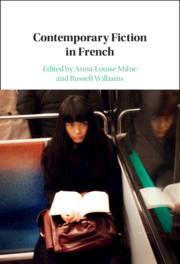Book contents
- Contemporary Fiction in French
- Contemporary Fiction in French
- Copyright page
- Contents
- Figures
- Notes on Contributors
- Introduction
- Chapter 1 Mediterranean Francophone Writing
- Chapter 2 After the Experiment
- Chapter 3 Getting a Future
- Chapter 4 Contemporary French Fiction and the World
- Chapter 5 The Franco-American Novel
- Chapter 6 Graphic Novel Revolution(s)
- Chapter 7 ‘Back in the USSR’
- Chapter 8 Fictions of Self
- Chapter 9 Trauma, Transmission, Repression
- Chapter 10 Wretched of the Sea
- Chapter 11 Urban Dystopias
- Chapter 12 Imagining Civil War in the Contemporary French Novel
- Notes
- Select Secondary Bibliography
- Index
Introduction
Mapping the Contemporary
Published online by Cambridge University Press: 30 March 2021
- Contemporary Fiction in French
- Contemporary Fiction in French
- Copyright page
- Contents
- Figures
- Notes on Contributors
- Introduction
- Chapter 1 Mediterranean Francophone Writing
- Chapter 2 After the Experiment
- Chapter 3 Getting a Future
- Chapter 4 Contemporary French Fiction and the World
- Chapter 5 The Franco-American Novel
- Chapter 6 Graphic Novel Revolution(s)
- Chapter 7 ‘Back in the USSR’
- Chapter 8 Fictions of Self
- Chapter 9 Trauma, Transmission, Repression
- Chapter 10 Wretched of the Sea
- Chapter 11 Urban Dystopias
- Chapter 12 Imagining Civil War in the Contemporary French Novel
- Notes
- Select Secondary Bibliography
- Index
Summary
This is a collection of essays about literature. The idea that literature is our first and principle port of call to explore contemporary fiction should not go without saying. If looking for fiction today, we might well turn towards other forms: television and film of course; mangas and video games as well. The corpus convened by this volume reaches in these directions. It includes essays that plot the massive development of graphic novels in the past two decades, that discuss crime fiction, the influence of film, the impact of television series and rock music. It also harbours various more or less fleeting intimations of YouTube and other online landscapes around the edges. One of the primary aims this collection gives itself is to blur the perimeter of the field of literature into the broader mediascape of digitally enabled or enhanced flows. Another is to focus this discussion around writing in French, where there is still a tendency in the field to demarcate French and Francophone literature. Our claim is that part of what is signified by ‘the contemporary’ is a detachment from that prior demarcation. The impetus today must be, in part, to think production in a major world language such as French through polycentric, fluctuating constellations. This does not mean to say that there is now no stake or significance in the places where this contemporary literature is emerging and finding its mechanisms of transmission and distinction, as well as its forms of economic viability. On the contrary. The transformations of the landscape that these chapters collectively assess are very largely conditioned by structures of distribution and translation. So our claim is not that global information technologies have smoothed the factors of differentiation, although they have undoubtedly reduced the lag in connection; but rather that the unevenness of the terrain is more complex today than an opposition between French and Francophone can accommodate. Just as the separation of genres on the basis of high/low, insider/outsider polarities is no longer tenable.
- Type
- Chapter
- Information
- Contemporary Fiction in French , pp. 1 - 16Publisher: Cambridge University PressPrint publication year: 2021



